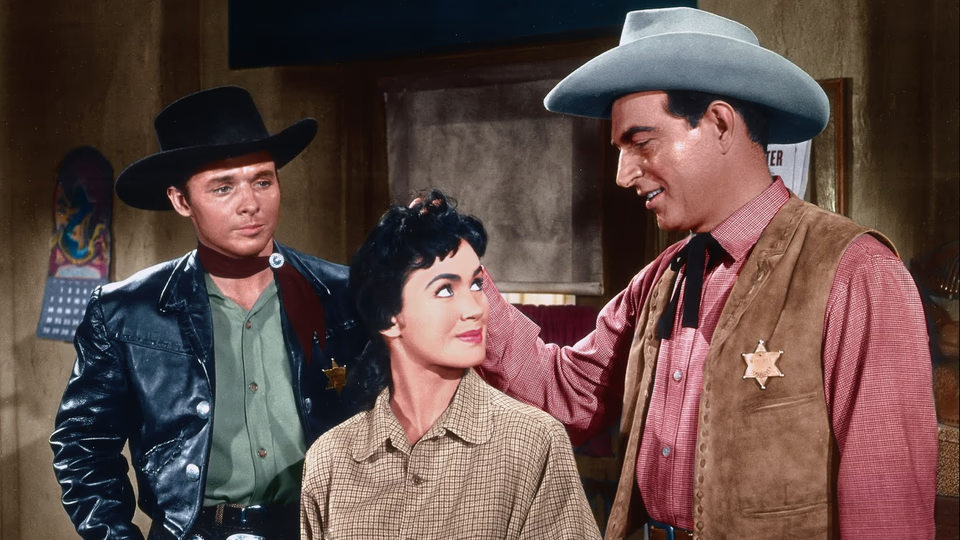The Duel at Silver Creek

Though Audie Murphy receives top billing in The Duel at Silver Creek, he’s actually a supporting player to Stephen McNally in this inane western.
The plot concerns a marauding band of claim jumpers. They ambush small-time prospectors, make them sign over their claims at gunpoint, then murder them and disappear the bodies.
As the film opens, they ambush a father-son duo, killing the father but not the son. The son, played by Murphy, gives pursuit, but loses the trail after the jumpers shoot his horse out from under him.
Cut to Silver City, where Marshal “Lightning” Tyrone prepares a posse to confront the claim jumpers. He tries to get local villain Johnny Sombrero to join, but Sombrero—who looks and sounds Mexican by way of Harlem—declines.
The posse rousts the claim jumpers, but the Marshal takes a bullet to the shoulder which paralyzes his shooting finger. He convalesces at an Army outpost where he falls for southern belle Opal Lacey, whom he takes to calling Brown Eyes.
But when Brown Eyes murders a wounded prisoner who could identify the claim jumpers, we learn she’s the sister of the gang’s leader.
Meanwhile, back in Silver City, the Marshal’s deputy gets a bullet in the back. When the Marshal returns, he goes looking for information and finds Brown Eyes, who implicates a stranger in town, the Silver Kid.
The Kid is, of course, Murphy, who’s now decked out in a black leather jacket and sporting a pair of gleaming six shooters. The Marshal finds him in the saloon, where he’s playing poker and winning. Lee Marvin, in his first credited feature, plays another gambler who, after the Kid takes a big pot, draws. The Kid draws faster and, because he’s a good guy, shoots the gun out of Marvin’s hand.
The Marshal questions the Kid and, confident he’s innocent, makes him a deputy. This improbable turn of events foreshadows a script teeming with them.
For example, the Kid takes a shine to Dusty, a young woman sweet on the Marshal, though the Marshal—oblivious to her feelings—treats her like a kid sister. The Kid susses out the situation, but still pursues her because the script says he must. Later Dusty takes it on herself to organize a prisoner swap with the bad guys, again, because the script says she must. But the biggest inanity comes with the film’s finale, a big shootout that sees the Marshal, Murphy, and their posse walk into a blatant trap that should have slaughtered them, yet somehow triumph because—you guessed it—the script says they must.
In his autobiography, A Siegel Film, director Don Siegel recounts how he agreed to the picture provided he could take a week with his assigned writer, Joseph Hoffman, and improve the script. Though the character names amused him (Lightning Tyrone, The Silver Kid, Opal Lacey, Johnny Sombraro, etc.), he felt everything else needed work.
Siegel began by asking Hoffman the obvious question: who gets the girl? Hoffman, agreeable, replied “Anyone you say.”
“Stephen McNally will never be a star,” said Siegel, “Audie Murphy may not be able to act, but a lot of stars fall into that category.”
The pair spent a week churning out pages to improve the script, but the result still feels wildly uneven. Consider the Marshal character. The script introduces him as a discerning, middle-aged lawman only to have him behave like a petulant love-sick teenager in the second act. McNally tries, but can’t distract from the forced plotting. Compounding matters, he and Faith Domergue—who plays Brown Eyes—have no chemistry.
More than once, this reminded me of a better produced version of John Wayne’s early poverty-row westerns. The bigger budget affords a longer running time, larger cast, and better sets and costumes, but the script feels just as rushed, and the cast chemistry as hit-or-miss. At least those poverty-row productions were shorter and featured better stunts.
To that end, Siegel’s original cut came in at only fifty-two minutes. He padded it out to seventy-seven minutes with prologue and epilogue scenes, which helps explain why Murphy disappears for much of the first act and the ludicrous finale. I suspect that shorter cut would play better.